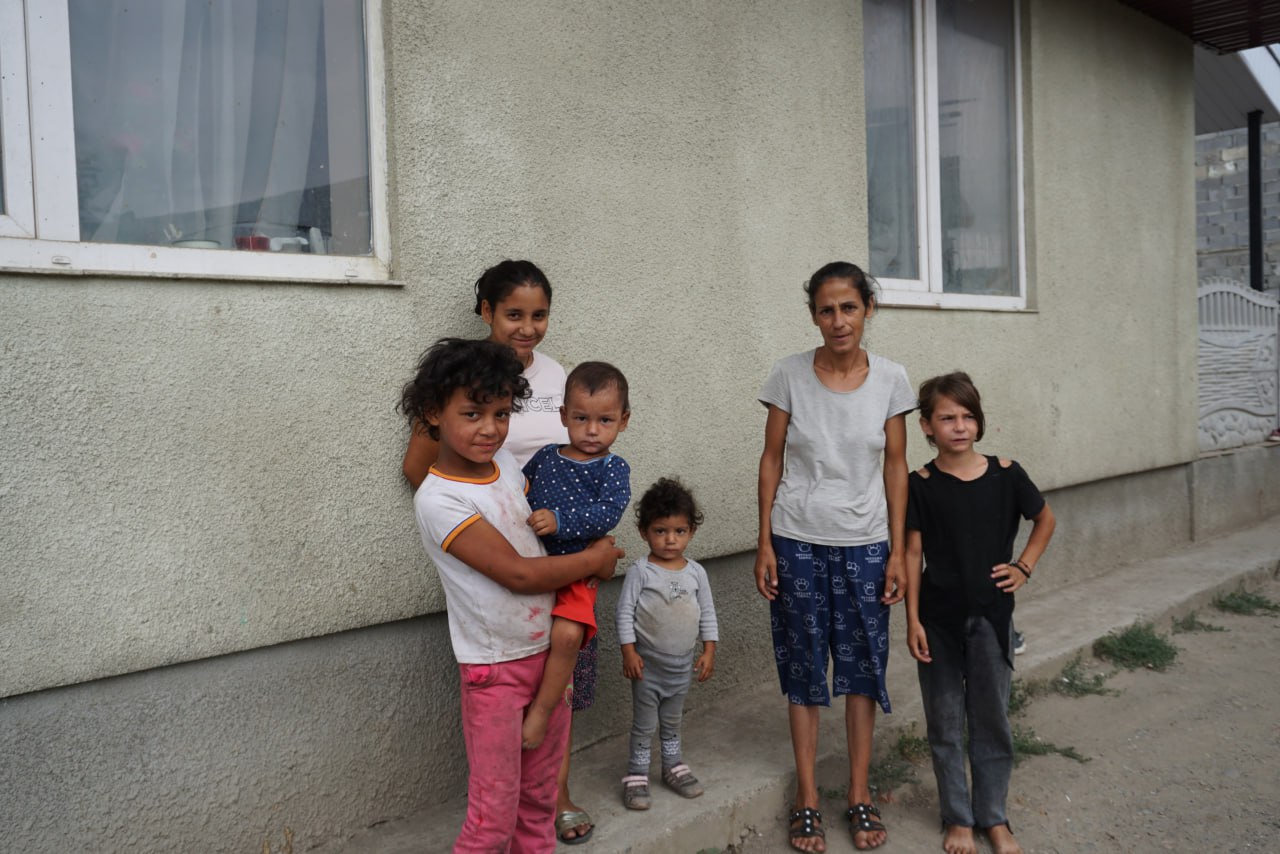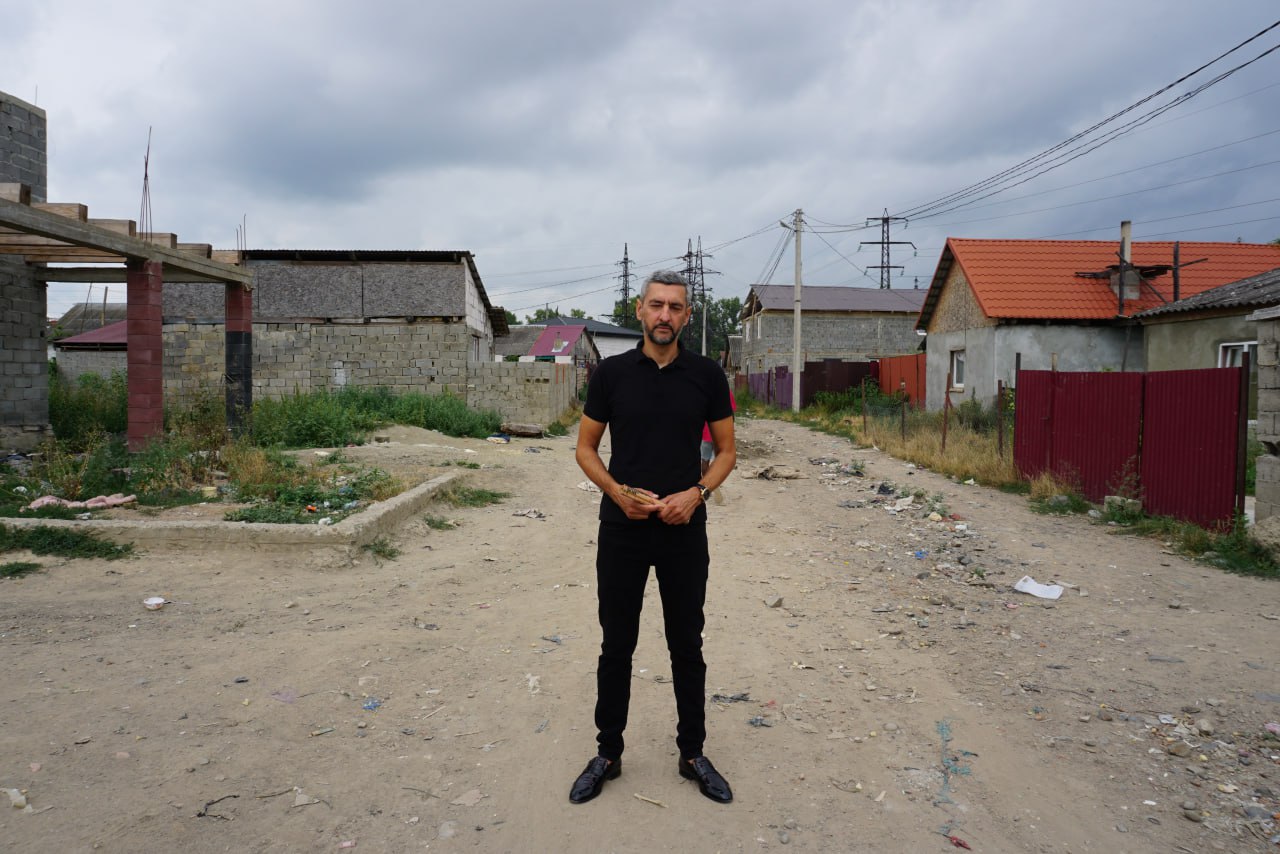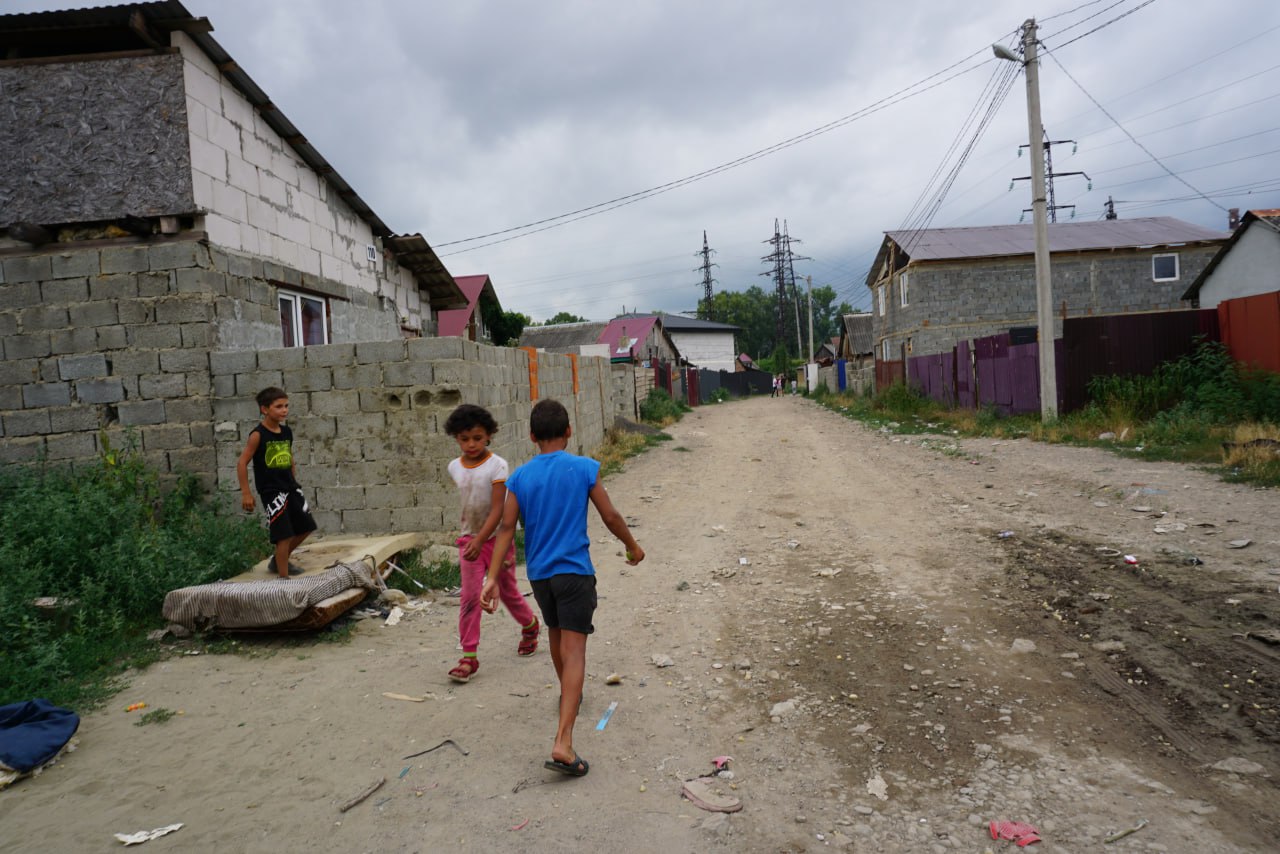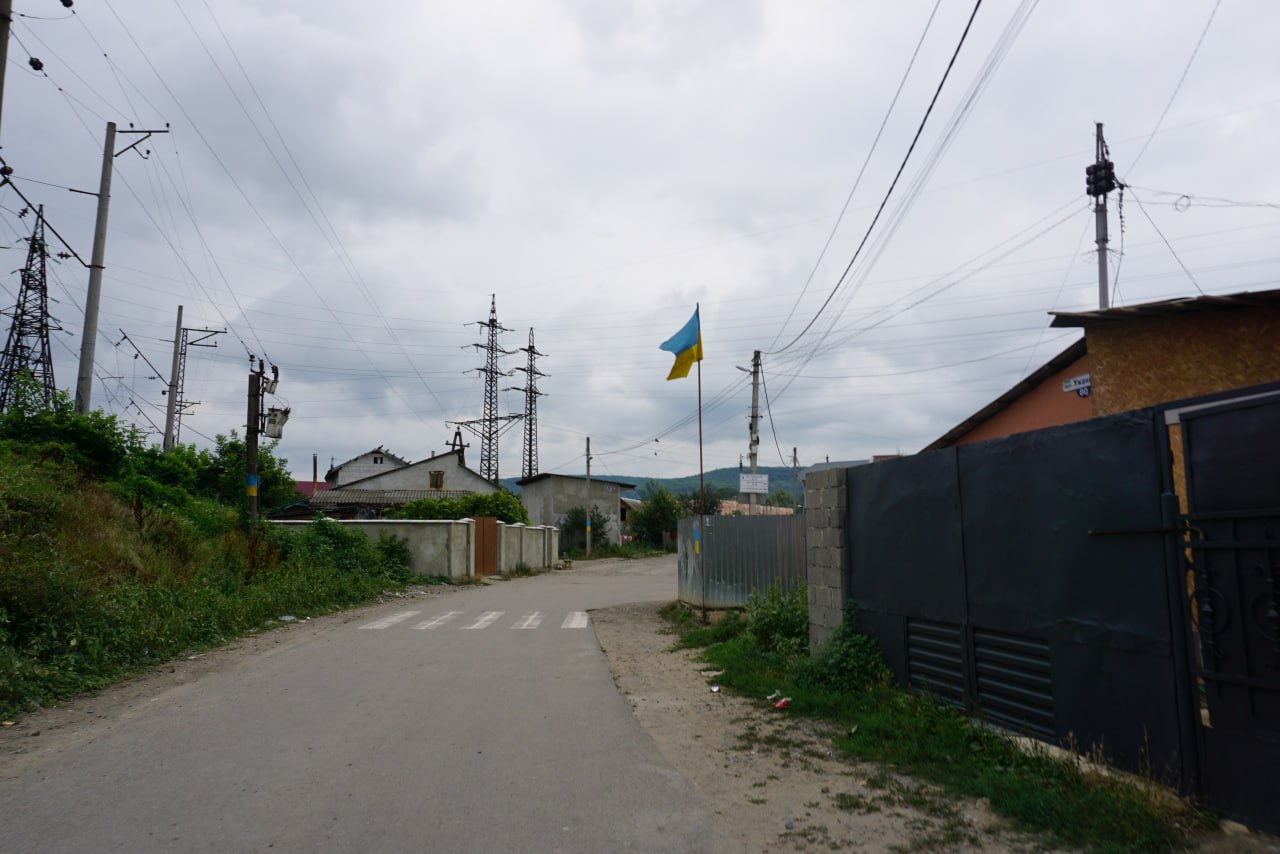Here lived Josyp Adam
How the Romani community of Uzhhorod city initiated a change of the name of the Romani baron, preserving the memory of one of their own.
Baron Jovska
— Jovska was a very good man. He used to share everything with us. Even what he had. He stood up for everyone. You can’t thank him enough.
Robert raises from the wooden bench in his yard where he was meditating in the perfect silence of that July day. A skinny bloke in a white t-shirt is initially somewhat shy—but when the topic of the conversation shifts to Joska, his face gets filled with joy and decisiveness, readiness to talk. Behind him gathers a group of barefooted children who, having noticed a photo camera, hide their childish eyes somewhere aside, laughing inside their company. In a minute, their dark eyes are inquisitively staring into the lens of my camera.
.jpg)
Photo: Robert, a resident of the street named after Josyp Adam
Robert lives with his wife, Liza, his children and grandchildren. All of them have lived in Radwanka, one of Uzhhorod City, for their entire life. Eleven years ago, he went to address the then-baron (leader of the Romani community), Josyp Ivanovych, asking for a plot of land for himself and his family. With each single year, Robert’s family became larger; children got married, grandchildren were born, so Robert wanted to erect a larger dwelling to accommodate his extended family next to him. Later, Josyp Ivanovych was addressed by many other Romanis who just did not have a place to live. All of them were asking for a piece of land to build a home. The Romani baron was thus helping everyone. He found a piece of land for each and every Romani family so that they could settle down this way or the other. A field where there was nothing but tall weeds was gradually turning into a human neighbourhood. It finally became a place where children’s laughter could be heard. After the Romani leader passed away, the entire Romani community decided to commemorate his name in the name of the future street.

A Baron and a Civil Leader
Josyp Adam was born in Uzhhorod, in the district of Radwanka, in a large Romani family, in 1945. This district is considered to be one of the largest Romani neighbourhoods in the city. As a child, young Josyp used to grow up among his own kind. He played football in the yard; he was inquisitive, keen to learn about the world around him. His love for his neighbour and his understanding how important it was to help those close to him was something his mother imposed upon him. She was an elderwoman in the Romani community back in the 1960s, hence she dealt with plenty of issues important to the Romanis of her city. By his mother’s bloodline, Josyp belonged to the Lovary Romani ethnic group; by his father’s bloodline he was a Slovak Roma. Josyp dreamt of getting the knowledge using which he could help the weaker ones—and then to relay that knowledge to the others. And so it was. Initially, he graduated from a general education school in Uzhhorod. Then he went to work at the Tysa Transcarpathian Machine Building Factory. He did manual labour both in Ukraine and abroad.
In 1993, Josyp Adam decided to set up Roma NGO, a Transcarpathian Romany Association, which attracted the most active Romani youth of that time. And thus, Josyp Adam became one of the firstmost civic leaders and human rights advocates of the Romani community in Uzhhorod. At the early 1990s, Roma NGO was actively working with Romani youth: it helped young men and women obtain documents, provided legal and social assistance to the most vulnerable Romani families.
«When the Romanis sing and dance, it is always a holiday. But when they return to quotidian life, it is always more difficult for them—especially for young people», — said Josyp Adam.
Not a Roma, not a Gajo either
A man in an elegant dark attire meets me in Donska Street—at the very beginning of the Radvanka district. He slowly finishes his morning cigarette, having made a slow pause. Before us we see a derelict railway track winding around an overgrown tight path. Snaking around, the narrow-gauge track is running along the door frames of someone’s semi-abandoned dwellings. It seems that anytime now, this abandoned railway is going to devour those houses, taking them onto a long journey, destination unknown. Once it was one of the most important mainline railway routes in Transcarpathia. The narrow-gauge line Uzhhorod-Radwanka-Antalovce began at Radwanka Train Station which was situated some 1km off the main wide-gauge station in the city. It ran through Vynohradiv County at the outskirts of Serednie village, and then turned north towards Viola (Viela) River, onwards to Antalovce in Croatia. Here was the source supplying the Austro-Hungarian military wood processing enterprise in Antalovice with raw wood materials.
Now, this track is frozen in time. Here, amid those empty railway tracks, children play footie using any ball they find in the street while dogs with shiny fur are barking every time anyone tries to cross to the other side of those tracks.
— We are now heading towards Josyp Adam Street. It begins right here.
Wearing his squeaky-clean, lacquered shoes, the man walks the grey gravel road. His name is Serhii Chichak, a Romani activist and human rights advocate. He is one of those who continues the cause of Josyp Adam, the former baron and Romani leader. Serhii is forty years old. He is Ukrainian on his mother’s line and Lovar Roma in his father’s line. Serhii used to be an outcast among Ukrainians for a long time and a Gajo ("not one of our own") among Romanis, too.

Photo: Serhii Chichak
— Josyp Ivanovych has always taught me to choose a profession which I would then be able to use to help other Romanis, — says Serhii as we walk the wide road of Radwanka. Ahead us, the Ukrainian flag is seen atop one of this neighbourhood’s improvised roadblocks. Serhii used to study at the Faculty of Law of Uzhhorod National University. He did his Master’s degree and, ever since his student’s years, he tried to help Romanis settle various legal issues. Today, the locals call him baron—although Serhii begs to differ. He says his profession is serving the community exactly in the way Mr Josyp would want it—and that is the most important thing. Serhii Chichak is married to Oktavia, Josyp Adam’s daughter. And so today, with their entire family, with Mr Josyp’s daughter Svitlana, Adam and Oktavia continue making her father’s dream come true. They are into enlightenment, cultural, and social activity to the benefit of the Transcarpathian Romanis.

The Councillors voted In Favour
In May this year, during their regular session, Councillors of Uzhhorod City Council voted to rename dozens of names of city streets formerly named in honour of Soviet and Russian figures. Then, another street was put on the list—which, at that time, bore no name at all. It was named in honour of Josyp Adam, a Romani civic activist, President of Roma NGO, three times councillor of Uzhhorod City Council. This initiative was tabled and then submitted for a vote to Uzhhorod City Council by Myroslav Horvat, a well-known Romani activist and politician.
«There will indeed be a Josyp Adam Street in the city of Uzhhorod. The decision was supported by my fellow councillors. I extend my thanks to each and every councillor who has supported us. I thank everyone involved in this commemoration. Romanis are an important part of our city and of our land», – wrote Mr Myroslav on his Facebook page after the session of the city council voted In Favour. This would be the first street in the province named in honour of a Romani activist.
Just a bit more, and we have reached our destination. The Josyp Adam Street is situated between Uzhanska and Prykordonna Streets in Radvanka district. It is circa 200m long. Behind it we hear the high-speed locomotive rushing along. The sprawling fields are spotted with unfinished residential houses. It gets more and more noisy now. In almost every building, the wicket door is open. One can hear jolly laughter of women and children who are walking out onto their porches to check out who’s the guest of their neighbourhood today. Serhii says that there is plenty of work ahead: to repair the road, to arrange the road items, illumination, to finalise privatisation of houses and arrangement for all the necessary documents. But the main thing is complete. Josyp’s story and his memory have been preserved—here, in this place, in the street where he used to live.
.jpg)
He was a Gypsy and knew what life was about
Pastor Rudolph is saying a prayer:
— Amaro Dad, kai Tu sal pro niebios.
.jpg)
So sounds the first line of the Lord’s Prayer in the Romani language. Rudoph approaches his table and invites everyone into the hall, as he himself takes his place in his wooden chair, above which, on the wall, a quote from the Gospel of St Luke is attached, in large letters.
— Josyp really, really wanted a church inside the encampment—so that people would not find it difficult to get to a church service. So that they could have a faith in God — says His Reverend Rudolph, as he recalls the beginning of the construction of a prayerhouse in Radvanka District. This construction was then initiated by Josyp Adam himself. Josyp Adam spent a couple of years convincing the city council to allocate a land lot for the construction of a temple. He attended every session of Uzhhorod City Council and never abandoned his idea of setting up a sacred place in the middle of the Romani encampment in Radvanka. He wanted the poorest Romanis to be able to socialise via religion, and to look for their own way to God.
Today, the Prayerhouse in Josyp Adam Street has a community of approximately 50 believers. They assemble here every Sunday with their Pastor, Rudolph Gorold, joining in prayer and discussion. This huge spacious house smells of freshness and coolness, amid the tiring Sunday heat. All of a sudden, Rudolph’s wife Maria appears. A short woman with short dark hair, wearing a neckpiece, she is one of the choir singers in the prayerhouse, glorifying God with her singing.
.jpg)
The woman starts making arrangements inside the temple, watering the flowers, setting up wooden chairs, getting the prayerhouse ready for the evening prayer. Rudolph says that, before the full-scale Russian invasion, they had a church service twice a week. Now it takes place only once a week. It is, though, important that people attend anyway. They come to see God. They come to see their own people, also remembering the person thanks to whom this temple was actually built in the first place.
— Well Josyp was a wonderful person. Smart. Decent. I used to know him for many years as a Romani patriot. He really did a lot for the Romani people. For each and every family. He was a Gypsy and he knew what life was about.
Pastor Rudolph takes a book entitled «The Good News from Luke» into his hands and immerses into slow reading, turning pages with no rush.
*****
The hot afternoon is slowly rolling down the long road battered with July wind. I can hear someone listening to the music from an old musical box. Under my feet, the gravel rustles, and those sounds intertwine with the twitting of field twitters. Human voices gradually fade away. Now, the Josyp Adam Street became completely quiet. People return to their residences where, behind closed wicket doors, each one of them is cherishing the memory of the one thanks to whom they all feel that they belong—and that they have the right to live in their own street.

See also
- «Невидимі. Стійкість: минуле і сучасність ромів». Як зрозуміти історію ромів через візуальну культу
- Альфреда Марковська: історія життя і порятунку інших
- «Дивись і не забувай»: 15 років Dikh He Na Bister у Кракові
- ФОТОРЕПОРТАЖ: У Києві відкрили виставку про ромську історію та ідентичність
- «Відновлення пам'яті – роми у Варшавському гетто». Історична екскурсія у Варшаві
- PHOTO REPORT: Events commemorating the victims of the Roma genocide in Babyn Yar
- 2 серпня — Міжнародний день памʼяті жертв геноциду ромів
- Коли допомога — це більше, ніж ваучер
- Антициганізм поруч: як розпізнати упередження у звичних словах і жартах
- Стереотип замість культури: як TikTok спрощує ромську ідентичність